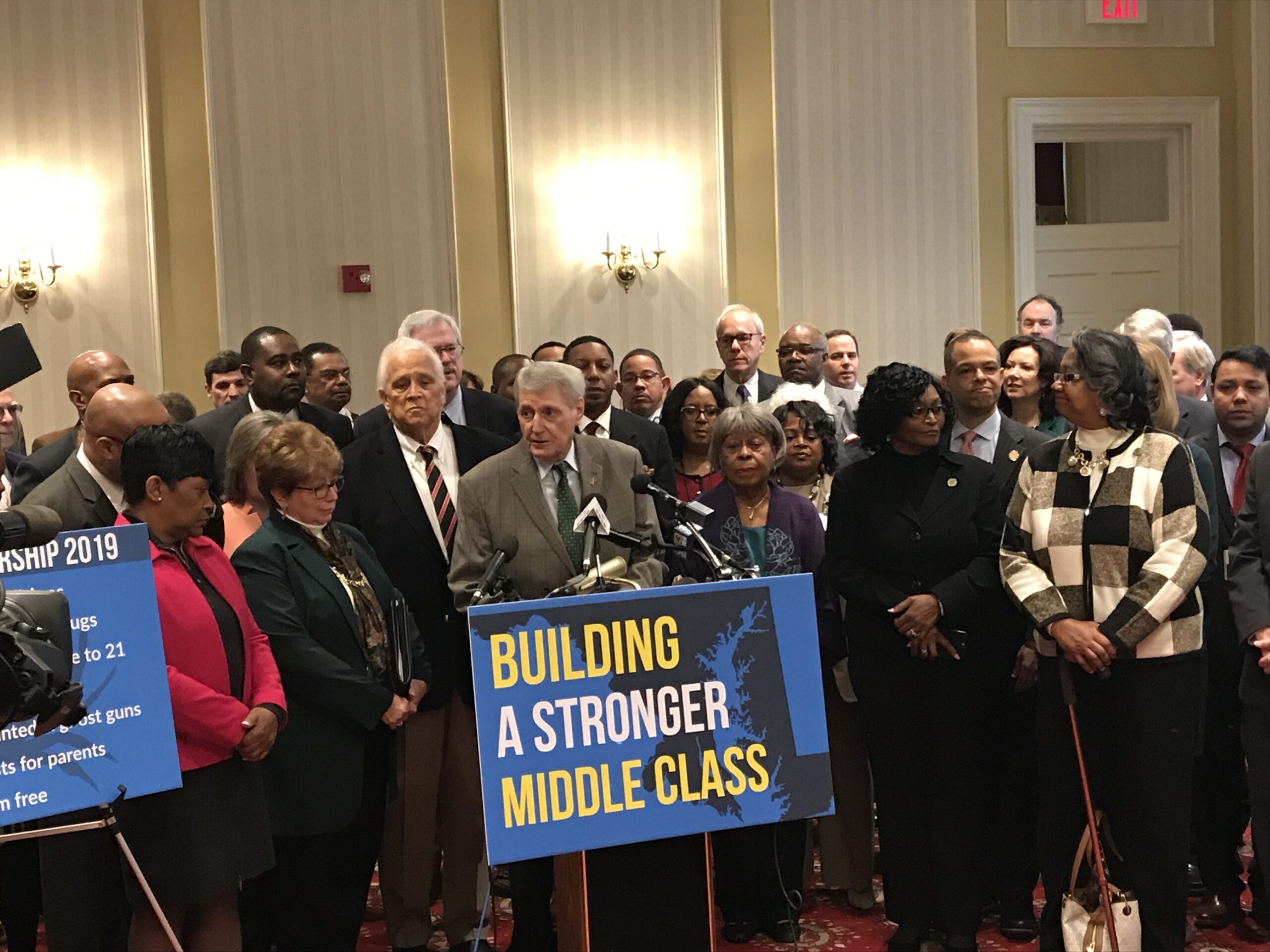Democrats’ Progressive Agenda to Focus on Lifting Maryland’s Middle Class

Maryland’s Democrats are standing with the state’s middle class this legislative session, leaders said Tuesday morning as they unveiled a legislative priorities package that includes a $15 minimum wage, increased child care credits and reforming health care.
“We think these pieces of legislation build a stronger middle class here in the state of Maryland and that’s what we’re all about,” House Speaker Michael E. Busch (D-Anne Arundel) said at a news conference.
Senate President Thomas V. Mike Miller Jr. (D-Calvert) said that while Maryland voters had re-elected Republican Gov. Lawrence J. Hogan Jr. in November, they also elected a more progressive and more Democratic legislature with a mandate to pursue progressive policies.
“We think we have a mandate to move forward for middle class and working Marylanders,” Miller said, adding that Democratic leadership would work with the governor on some of his priorities as well, including on economic development programs for poor neighborhoods and tougher criminal sentencing laws for repeat offenders.
The Maryland Democratic leaders delivered their agenda – flanked by dozens of rank-and-file lawmakers – one day before Hogan is scheduled to deliver his annual State of the State speech in the House chamber. Hogan largely talked about the national political dynamic during his inaugural address two weeks ago but is expected to lay out elements of his second-term policy agenda on Wednesday.
“We’re going to work with him on his issues, but guess what – he’s going to have to compromise in terms of working men and working women,” Miller said.
House Republicans released a four-point legislative agenda late last week.
The Democrats’ priorities include some measures that have failed to gain traction in the past, including increasing the minimum wage to $15 an hour, a statewide ban on polystyrene containers and establishing a prescription drug affordability board.
All three of these measures fell short in last year’s General Assembly session. The fact that they’re now leadership-approved measures reflects the leftward drift of the Democratic caucuses in both changes of the legislature.
Likely to generate debate is the “Fight for 15” bill, which has widespread generalized support among Democrats, though lawmakers differ on how the legislation should ultimately pass.
“A state as wealthy as Maryland … we can do better and we will do better,” House Economic Matters Chair Dereck E. Davis (D-Prince George’s) said. “I look forward to a very rigorous debate on this, but I promise you when that debate’s finished, our workers will see a raise beginning this year as we head towards $15 an hour.”
After the news conference, Davis said he wasn’t certain what form the final bill would take, but he wants to make sure a provision to provide automatic annual increases based on inflation remains in place. “I don’t want to keep doing this every year,” Davis said.
The other priorities in the legislative package:
- Curbing the cost of prescription drug costs by establishing a commission to increase transparency for the cost and choices of prescription drugs, as well as legislation to cap the out of pocket drug costs to state retirees.
- Protecting health insurance reforms, including the Affordable Care Act ban on denying insurance for pre-existing conditions.
- Limiting tobacco use to those over 21 years of age, a top policy priority of the Legislative Black Caucus and a move already undertaken by six other states.
- Banning 3-D guns and gun-building kits to create “ghost guns.”
- Banning polystyrene to curb waterway pollution and potential negative health effects.
- Adding $20 million to the state’s budget for child care tax credits to expand access to the program.
Senate Finance Chair Delores G. Kelley (D-Baltimore County) said the tax credit hasn’t been updated for 20 years, while the cost of care in Maryland has increased to nearly $14,000 a year for each child.
“If we’re trying to worry about wages for working families and middle-class families, it won’t do any good if just to make sure the kids are properly cared for takes almost everything the family has,” Kelley said.
Busch did not rule out the possibility that other pieces of legislation could become the priorities of Democratic leadership later in the 90-day session. Miller said Democrats were sure to move legislation to begin to fund education funding recommendations issued by the so-called Kirwan Commission.




 Creative Commons Attribution
Creative Commons Attribution